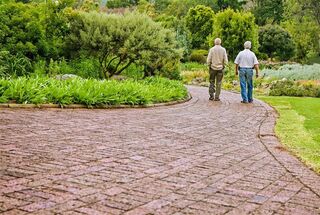Friends
12 Ways to Make Friends in Mid-Life and Beyond
Finding it harder to make friends as you age? Try these tips.
Posted November 7, 2022 Reviewed by Devon Frye
Key points
- Many older adults find it more difficult to make new friends as they age.
- Research shows that friendship is strongly related to happiness, mental health, and longevity in older adulthood.
- These 12 techniques for connecting with friends can increase your comfort seeking out and taking initiative with potential friends.

Conventional wisdom holds that it’s harder to make friends as we get older. Is that true?
It’s not a trivial question. Friendships are a key predictor of both happiness and longevity as we age. A strong social network reduces the risk of early death by about 45 percent, according to meta-analyses.* By contrast, social isolation and loneliness are linked to a higher risk of dementia, heart disease, depression, and other harms to mental and physical health. Research even indicates that loneliness is as much of a health risk as smoking 15 cigarettes a day or having an alcohol use disorder.
So it's alarming that some studies support the belief that making friends after retirement and even in mid-life is more challenging. Earlier in life, school, college, and work provided ready-made social networks with all sorts of friendship possibilities. Older people often lack those natural networks.
To add to the challenge, researcher Laura Carstensen notes that there is “a developmental tendency for people to prune social networks as they get older… and get rid of those people not particularly emotionally close or meaningful.” As a friend of mine said recently, “I’m more particular about who I spend time with.” Given this tendency, it can be harder for a new person to break into an established group. In addition, friendships can be disrupted and/or end when older people move to retirement communities, to other states, and when, sadly, death takes its inevitable toll.
So, yes, it’s true that retirees and older people may have to work harder to make friends. Still, it is possible. In fact, research notwithstanding, older people have at least one major advantage over people in mid-life: time. When raising children, holding down a full-time job, and helping out one’s own aging parents, who had time to make new friends? (Not I, at any rate.) With more time and a little effort, connecting with new people can happen with reasonable ease.
How to Make Friends As an Older Adult
Here is what I have discovered from my own late-life friendships, from talking to older friends, and from research. These tips for making friends are useful after retirement but also at any time of life.
1. Make the decision that friendship is important to you.
As I have pointed out elsewhere, the decision to make a change is the beginning of successful change. Let yourself know that your life would be better with friends and why.
2. Realize that making friends requires a deliberate effort.
As luck would have it, as I was writing this, I heard about the new book by counseling psychologist Marisa Franco: Platonic: The Secret to Making Friends as an Adult. One of Franco’s central ideas, highlighted in her post here, is that friendships don’t just happen by magic. You have to be intentional—that is, to make a deliberate effort to engage with people, to show interest in potential friends, and sometimes to take initiative by setting up dates or responding enthusiastically if others reach out to you.

3. Take responsibility for organizing a get-together.
Related to #2, you will sometimes need to be The Organizer and arrange to do something—lunch, coffee—with your friend. There are no guarantees that your target friend is interested in exploring a friendship with you, but you’ll never know unless you try. At the very least, exchange contact information. Situations change.
4. Don’t take it personally if your attempts at friendship flounder.
Your prospective friends may be overwhelmed by various life challenges right now. Move on. Maybe you’ll find common ground at another time.
5. "Promote" former colleagues to friends.
In the workplace, friendship can be problematic. You could overshare, show favoritism, or find it hard to set boundaries between work activities and friend activities. But once you’ve retired, these barriers can dissolve. Now many of my former colleagues are cherished friends whom I see regularly.
6. "Promote" acquaintances and neighbors to friends.
Over my years of full-time work, I had professional contact with a variety of people. After retirement, I happened to run into two of them (separately). We had coffee and immediately bonded over our mutual love of writing. They’ve become dear friends.
7. Get back in touch with old friends.
Thanks to high school reunions, I’ve reconnected with old friends and discovered new friends among my old classmates. We’re scattered across the country, but emails, cards, Facebook, and the occasional Zoom meeting can keep us in touch when we can't meet up in person.
8. Be bold and invite yourself into groups.
I was recently meeting with a friendship group of three women when the neighbor dropped in. "How do I get into this group?" she asked. Asked and answered—she was in!
9. Join a group that meets regularly.
Franco, the friendship expert, cites a fascinating research finding: “The mere exposure effect.” That means that the more that people see you on a regular basis, the more they will like you. The mere exposure effect increases the odds that your attempts to connect with potential friends are more likely to be successful when people are more familiar with you.
Try a book group, a coffee group, a choir, AA or Al-Anon, a church group, or a neighborhood group. Bolster your social support networks by volunteering or working part-time.

10. Make friends with people of different ages and backgrounds in person and on social media.
Fully half my Facebook friends are acquaintances or friends of friends. Still, I find that connecting with them is meaningful. Everyone has something to offer.
11. Know that you don’t have to have a “best friend.”
It’s great to have one special friend, someone with whom you can share your deepest feelings, but it’s not a requirement for happiness. You can enjoy a variety of people for who they are and for what you can learn from them.
12. Value both your activity friends and your intimate friends.
While you may be looking for a kindred spirit, activity friends are valuable, too. Besides, after a while, you may discover that your tennis friend is a pleasure to talk with as well as spar with. Friendships grow and change. As psychologist Eileen Kennedy-Moore writes, "It’s important to recognize that many different kinds of friends can brighten our lives." Kennedy-Moore is referring to children's friendships, but that idea applies just as well to adult friendships.
In Sum
Friendships offer benefits different from those of family and romantic relationships—freedom from certain roles and obligations, for example, as well as flexibility. “It can bring us a once-a-month lunch friend or a soulmate,” Franco writes in Platonic.
Moreover, friendships are important for both physical and mental health. In old age, friends can buffer the harsh blows and losses that aging can bring. So, if you’ve tried these, or other, tips for making friends in adulthood and they haven’t worked, talk to a therapist for insight, suggestions, or support.
(c) Meg Selig, 2022.
*According to science journalist Marta Zaraska, meta-analyses reveal that a committed romantic relationship lowers mortality risk the most, by 49 percent. Having a strong social network comes in second, reducing the probability of early death by about 45 percent.
References
Franco, M. G. (2022). Platonic: How the Science of Attachment Can Help You Make--and Keep--Friends. NY: G.P. Putnam's Sons.
Zaraska, M. (2020). Growing Young: How Friendship, Optimism, and Kindness Can Help You Live to 100. Penguin Random House Canada.
Novotney, A. "The Risks of Social Isolation." APA: May 2019, Vol 50, No. 5.
Blieszner, R. et al. "Friendship in Later Life: A Research Agenda." Innovation in Aging, Volume 3, Issue 1, January 2019. (https://doi.org/10.1093/geroni/igz005)




